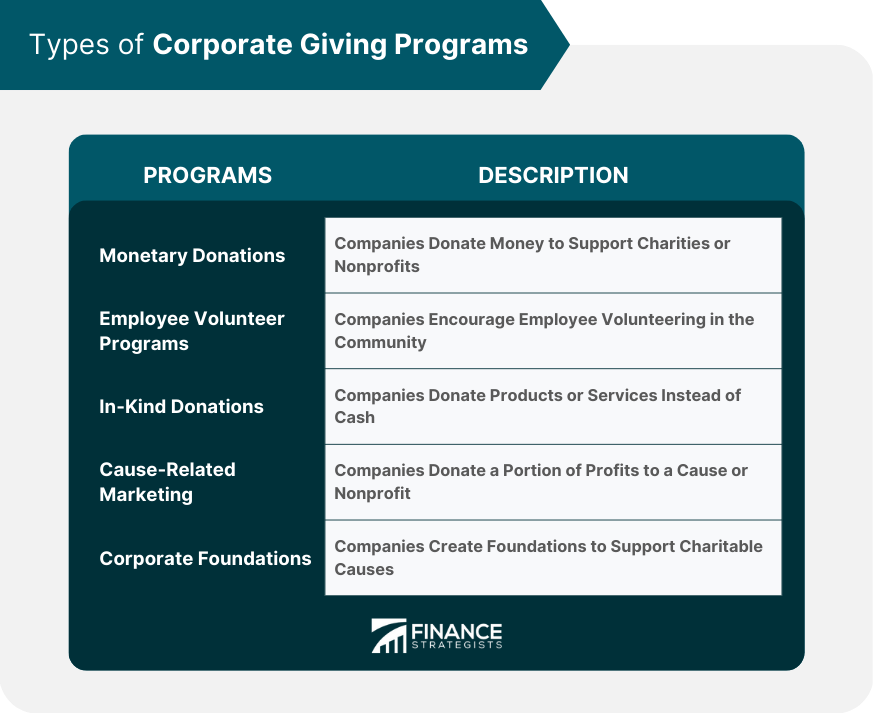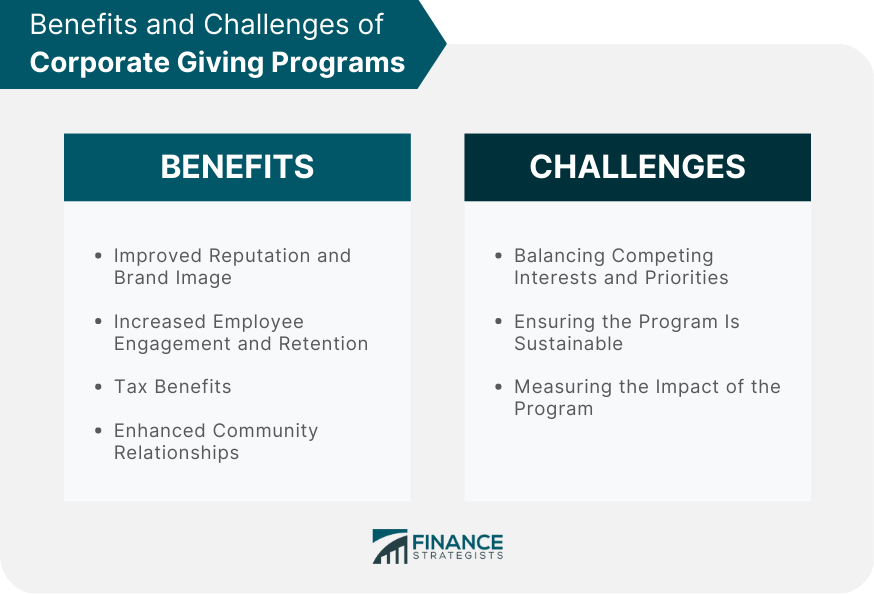Corporate giving programs are initiatives launched by companies to contribute to their communities and support various causes through charitable donations and volunteer work. These programs are designed to impact society positively and are a crucial component of corporate social responsibility. Corporate giving programs can take many forms, such as donations of money, products, or services, employee volunteering, or partnering with local nonprofit organizations. Companies can establish giving programs to support causes such as education, health, poverty reduction, environmental sustainability, or other issues that align with their values and goals. Corporate giving programs aim to create a sustainable, long-term impact on the community while fostering employee engagement and boosting the company's reputation as a responsible corporate citizen. Corporate giving programs take many forms. Some of the most common types of corporate giving programs include: One of the most traditional forms of corporate giving is through monetary donations. Companies may choose to donate to various charities or nonprofit organizations to support their mission. Another type of corporate giving program is the employee volunteer program. Companies may encourage their employees to participate in volunteer activities in the community, such as planting trees, serving meals at a homeless shelter, or cleaning up a park. Companies may also choose to donate products or services in-kind rather than cash. For example, a company may donate computers to a school or provide legal services to a nonprofit organization. Cause-related marketing is another way that companies can engage in corporate giving. Companies may choose to donate a portion of their profits to a specific cause or nonprofit organization. Some companies may also create their own corporate foundations to support various charitable causes. These foundations may be funded through corporate profits, employee contributions, or a combination of both. Corporate giving programs offer a variety of benefits for both the company and the community. Some of the most significant benefits of corporate giving programs include: Corporate giving programs can help to enhance a company's reputation and brand image. Companies that engage in corporate giving are viewed as socially responsible and committed to positively impacting society. Corporate giving programs can also increase employee engagement and retention. Employees who can participate in volunteer activities or feel that their company is positively impacting the community are often more satisfied with their jobs. Companies may also receive tax benefits for their corporate giving. Donations to qualified nonprofit organizations are tax-deductible, which can help to reduce a company's tax liability. Corporate giving programs can help to build strong relationships between the company and the community. By supporting local causes and organizations, companies can demonstrate their commitment to the community and build goodwill among residents. Corporate giving programs also face various challenges that can impact their effectiveness. Some of the most significant challenges include: Companies must balance their commitment to social responsibility with their need to generate profits. This can create competing interests and priorities that can be difficult to navigate. Corporate giving programs must be sustainable over the long term to have a meaningful impact on the community. Companies must ensure that their giving programs are financially viable and positively impact the community. Measuring the impact of corporate giving programs can be challenging. Companies must determine which metrics to track and how to measure the impact of their programs on the community. Creating a successful corporate giving program requires careful planning and execution. Some key strategies for creating successful corporate giving programs include: Corporate giving programs should be aligned with the company's values and goals. For example, companies that are committed to environmental sustainability may choose to support nonprofits that work to protect the environment. A clear mission statement is essential for any successful corporate giving program. The mission statement should outline the goals and objectives of the program and provide a clear direction for future initiatives. Companies should measure the impact of their corporate giving programs to determine whether they are achieving their goals. This may involve tracking metrics such as the number of volunteer hours contributed by employees, the amount of money donated to various organizations, or the impact of the program on the community. Employees should be involved in the decision-making process for corporate giving programs. This can help to increase employee engagement and ensure that the program is aligned with the company's values and goals. Employees should also be encouraged to volunteer their time and skills to support the program. Building strong partnerships with local organizations is essential for creating a successful corporate giving program. Companies should work closely with local nonprofits and community groups to identify the community's most pressing needs and develop effective solutions. There are many examples of successful corporate giving programs that have made a significant impact on their communities. Some notable examples include: The 5by20 program is a global initiative by The Coca-Cola Company to empower 5 million women entrepreneurs by 2020. The program provides women access to business skills training, financial services, and other resources to help them start and grow their businesses. Target is committed to supporting the communities in which it operates. The company's community giving programs include a variety of initiatives, such as donating 5% of its profits to support education and providing volunteer opportunities for employees. Microsoft's employee giving program encourages employees to give back to their communities by providing matching donations and volunteer opportunities. The program has raised millions of dollars for various nonprofit organizations and helped improve people's lives worldwide. Corporate giving programs can benefit companies and communities by fulfilling their corporate social responsibility, improving their reputation, and positively impacting society. By aligning their giving programs with their values and goals, creating clear mission statements, measuring the impact of their programs, involving employees in decision-making and volunteering, and building strong partnerships with local organizations, companies can create successful giving programs that make a meaningful difference in the world. If you are interested in implementing a giving program, consulting with a wealth management professional may be helpful. They can help you create a plan that aligns with your values and goals and provide guidance on managing your finances to ensure your giving program is sustainable over the long term. What Are Corporate Giving Programs?
Types of Corporate Giving Programs
Monetary Donations
Employee Volunteer Programs
In-Kind Donations
Cause-Related Marketing
Corporate Foundations

Benefits of Corporate Giving Programs
Improved Reputation and Brand Image
Increased Employee Engagement and Retention
Tax Benefits
Enhanced Community Relationships
Challenges in Corporate Giving Programs
Balancing Competing Interests and Priorities
Ensuring the Program Is Sustainable
Measuring the Impact of the Program

Strategies for Creating Successful Corporate Giving Programs
Aligning With Company Values and Goals
Creating a Clear Mission Statement
Measuring the Impact of the Program
Involving Employees in Decision-Making and Volunteering
Building Partnerships With Local Organizations
Examples of Successful Corporate Giving Programs
The Coca-Cola Company’s 5by20 Program
Target’s Community Giving Programs
Microsoft’s Employee Giving Program
Conclusion
Corporate Giving Programs FAQs
Corporate giving programs are initiatives launched by companies to contribute to their communities and support various causes through charitable donations and volunteer work. These programs are important because they help companies fulfill their corporate social responsibility and improve their reputation while positively impacting society.
Companies can create successful corporate giving programs by aligning their giving programs with their values and goals, creating clear mission statements, involving employees in decision-making and volunteering, measuring the impact of their programs, and building strong partnerships with local organizations.
Some examples of successful corporate giving programs include The Coca-Cola Company's 5by20 program, Target's community giving programs, and Microsoft's employee giving program. These programs have significantly impacted their communities by empowering women entrepreneurs, supporting education, and encouraging employee volunteering and donations.
Corporate giving programs face challenges such as balancing competing interests and priorities, ensuring the program is sustainable over the long term, and measuring the impact of the program on the community. Companies must navigate these challenges to create effective giving programs that have a meaningful impact.
Corporate giving programs offer many benefits for companies and communities. They help companies fulfill their corporate social responsibility, boost their reputation, and engage employees. For communities, corporate giving programs provide critical support for various causes and can create sustainable, long-term impacts.
True Tamplin is a published author, public speaker, CEO of UpDigital, and founder of Finance Strategists.
True is a Certified Educator in Personal Finance (CEPF®), author of The Handy Financial Ratios Guide, a member of the Society for Advancing Business Editing and Writing, contributes to his financial education site, Finance Strategists, and has spoken to various financial communities such as the CFA Institute, as well as university students like his Alma mater, Biola University, where he received a bachelor of science in business and data analytics.
To learn more about True, visit his personal website or view his author profiles on Amazon, Nasdaq and Forbes.











